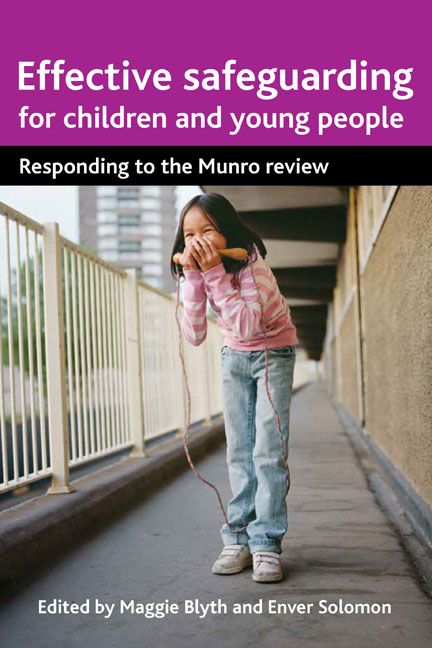Book contents
- Frontmatter
- Contents
- List of abbreviations
- Notes on contributors
- Acknowledgements
- Foreword
- one Early intervention
- two Local safeguarding children boards: faith, hope and evidence
- three The child's voice in the child protection system
- four Parental mental health, risk and child protection: what does Munro mean to child protection and adult mental health?
- five Adolescent-to-parent abuse and frontline service responses: does Munro matter?
- six Older children and the child protection system
- seven Serious case review
- Index
six - Older children and the child protection system
Published online by Cambridge University Press: 07 September 2022
- Frontmatter
- Contents
- List of abbreviations
- Notes on contributors
- Acknowledgements
- Foreword
- one Early intervention
- two Local safeguarding children boards: faith, hope and evidence
- three The child's voice in the child protection system
- four Parental mental health, risk and child protection: what does Munro mean to child protection and adult mental health?
- five Adolescent-to-parent abuse and frontline service responses: does Munro matter?
- six Older children and the child protection system
- seven Serious case review
- Index
Summary
Child protection of young people aged 11 to 17 is a surprisingly unexplored issue. In this chapter we review two recent research studies in England that aimed to address this gap. We present the key findings from these projects and consider their implications in the light of the Munro Review of Child Protection and the government's response.
The Munro Review itself acknowledges some of the potentially distinctive aspects of child protection issues in relation to this particular age group (Munro, 2011: s 2.30, p 37). The government's response also contains specific acknowledgement of this issue:
Children in all age groups can be vulnerable so it is important that … services also address the needs of older children to provide a timely offer of help to teenagers. The importance of early help for this age group is as vital as it is for young children. (DfE, 2011: 9)
We will discuss the relevance of some of the key themes emerging from the government's response to the Munro Review when considering how to meet the protective needs of young people aged 11 to 17 who may be experiencing maltreatment.
Young people aged 11 to 17 and the child protection system in England
Almost a quarter of all children who become the subject of a child protection plan in England are aged between 10 and 15 years old. It is also notable that, as for younger children, neglect remains the most common category of maltreatment, even among this older age group. Given their developmental stage, maltreated young people in this age group will often face different issues and require different responses than younger children. In fact, age-related considerations can affect definitions of what constitutes ‘maltreatment’ – for example, levels of parental supervision that would be deemed extremely neglectful in relation to a very young child would be regarded as normative parenting of an older teenager. Yet, until recently, the specific issues faced by older young people, and the professionals working with them, have not been a prominent theme within child protection research, policy and practice.
Part of the reason for the neglect of this issue may stem from the way the child protection system has developed in England over the past few decades.
- Type
- Chapter
- Information
- Effective Safeguarding for Children and Young PeopleWhat Next after Munro?, pp. 107 - 126Publisher: Bristol University PressPrint publication year: 2012



